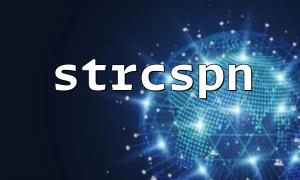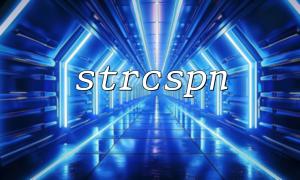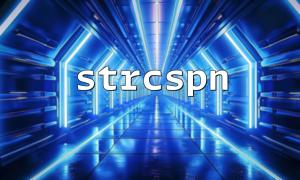The strcspn function in PHP is used to find the first occurrence of any character from a specified set within a string. Its function definition is as follows:
<span><span><span class="hljs-keyword">int</span></span><span> </span><span><span class="hljs-title function_ invoke__">strcspn</span></span><span>(</span><span><span class="hljs-keyword">string</span></span><span> </span><span><span class="hljs-variable">$haystack</span></span><span>, </span><span><span class="hljs-keyword">string</span></span><span> </span><span><span class="hljs-variable">$characters</span></span><span>)</span></span>$haystack: The string to search within.
$characters: The set of characters to match.
The strcspn function returns the position index (i.e., the number of characters) from the start of $haystack up to the first occurrence of any character in $characters. If no matching character is found, it returns the total length of the string.
For example:
<span><span><span class="hljs-variable">$str</span></span><span> = </span><span><span class="hljs-string">"Hello, World!"</span></span><span>;
</span><span><span class="hljs-variable">$index</span></span><span> = </span><span><span class="hljs-title function_ invoke__">strcspn</span></span><span>(</span><span><span class="hljs-variable">$str</span></span><span>, </span><span><span class="hljs-string">",!"</span></span><span>);
</span><span><span class="hljs-keyword">echo</span></span> </span><span><span class="hljs-variable">$index</span></span>; </span><span><span class="hljs-comment">// Outputs 5 because "," and "!" appear at positions 5 and 7</span></span><span>
</span></span>URL encoding is typically used to ensure that special characters in URLs are transmitted safely, avoiding errors or ambiguities in HTTP requests. For example, spaces are encoded as %20, # as %23, and & as %26, among others.
When parsing URL-encoded strings, especially when extracting parameters from query strings, it’s important to handle these special characters correctly. Traditional string splitting methods can result in parsing errors due to these characters.
When parsing a URL query string or extracting the value of a parameter from a URL, strcspn can effectively help locate the position of target characters. Particularly when dealing with complex encodings, strcspn allows precise control over the start and end positions for substring extraction.
Suppose we have a URL-encoded query string and want to extract the value of a specific parameter:
<span><span><span class="hljs-variable">$url</span></span><span> = </span><span><span class="hljs-string">"https://example.com/page?name=John+Doe&age=25&city=New%20York"</span></span><span>;
</span></span>To extract the name parameter value, i.e., John+Doe, we can use strcspn to pinpoint it:
<span><span><span class="hljs-comment">// Find the string after name=</span></span><span>
</span><span><span class="hljs-variable">$param_str</span></span><span> = </span><span><span class="hljs-string">"name=John+Doe&age=25&city=New%20York"</span></span><span>;
</span><span><span class="hljs-variable">$start</span></span><span> = </span><span><span class="hljs-title function_ invoke__">strpos</span></span><span>(</span><span><span class="hljs-variable">$param_str</span></span><span>, </span><span><span class="hljs-string">"name="</span></span>) + </span><span><span class="hljs-number">5</span></span>; </span><span><span class="hljs-comment">// Find the start position of name= and skip "name="</span></span><span>
</span><span><span class="hljs-variable">$end</span></span><span> = </span><span><span class="hljs-title function_ invoke__">strcspn</span></span><span>(</span><span><span class="hljs-title function_ invoke__">substr</span></span><span>(</span><span><span class="hljs-variable">$param_str</span></span><span>, </span><span><span class="hljs-variable">$start</span></span><span>), </span><span><span class="hljs-string">"&"</span></span>); </span><span><span class="hljs-comment">// Find the next & or the end</span></span><span>
<p></span>$value = substr($param_str, $start, $end);<br>
echo </span>$value; </span>// Outputs John+Doe<br>
</span>In this example, strcspn is used to find the number of characters from after name= up to the next & (or the end of the string), effectively extracting the parameter value John+Doe.
In URL encoding, spaces are often represented as +, while %20 also represents a space. Careful handling is required to ensure correct decoding. For example, given the URL-encoded string John+Doe, to convert it to John Doe, strcspn can be used for precise processing.
<span><span><span class="hljs-variable">$encoded_str</span></span><span> = </span><span><span class="hljs-string">"John+Doe"</span></span><span>;
</span><span><span class="hljs-variable">$index</span></span><span> = </span><span><span class="hljs-title function_ invoke__">strcspn</span></span><span>(</span><span><span class="hljs-variable">$encoded_str</span></span><span>, </span><span><span class="hljs-string">"+"</span></span>); </span><span><span class="hljs-comment">// Find the position of the '+' symbol</span></span><span>
</span><span><span class="hljs-variable">$decoded_str</span></span><span> = </span><span><span class="hljs-title function_ invoke__">substr</span></span><span>(</span><span><span class="hljs-variable">$encoded_str</span></span><span>, </span><span><span class="hljs-number">0</span></span><span>, </span><span><span class="hljs-variable">$index</span></span><span>) . </span><span><span class="hljs-string">" "</span></span><span> . </span><span><span class="hljs-title function_ invoke__">substr</span></span><span>(</span><span><span class="hljs-variable">$encoded_str</span></span><span>, </span><span><span class="hljs-variable">$index</span></span><span> + </span><span><span class="hljs-number">1</span></span><span>);
<p></span>echo </span>$decoded_str; </span>// Outputs John Doe<br>
</span>This method not only accurately extracts John and Doe but also handles the special characters in URL encoding through strcspn.
From the examples above, it is clear that the strcspn function plays a significant role in handling URL encoding. Whether extracting parameter values from query strings or dealing with encoded characters in URLs, strcspn allows us to work efficiently and accurately. By skillfully using the character search capabilities of strcspn, we can avoid errors that traditional string splitting methods might cause, making URL parsing more stable and reliable.
Related Tags:
URL




